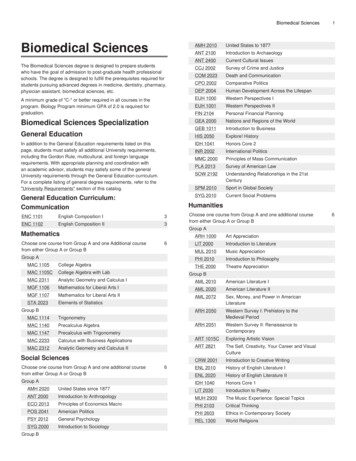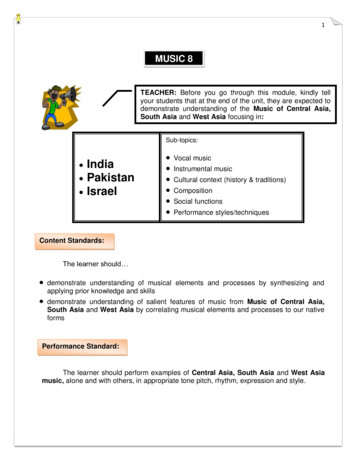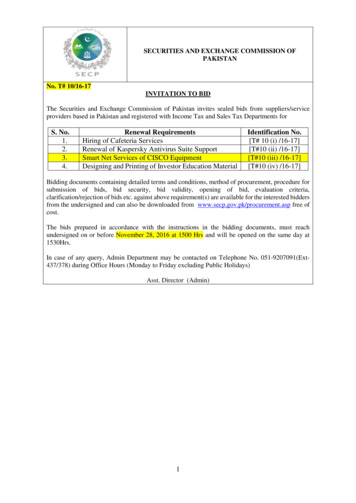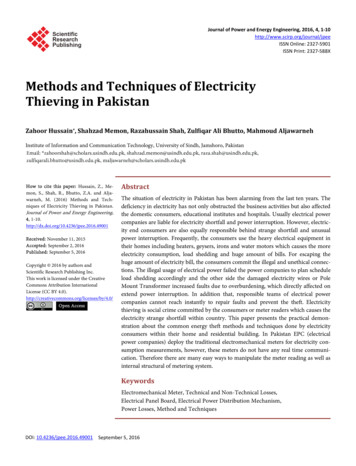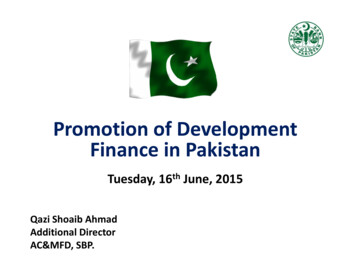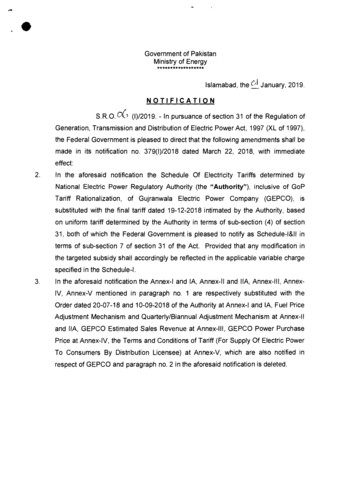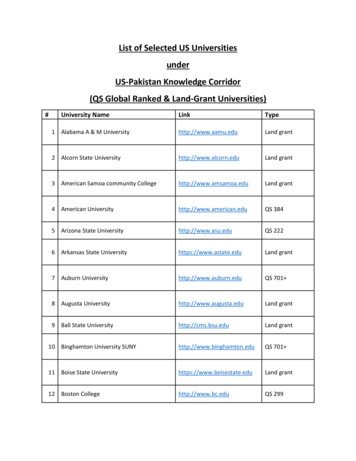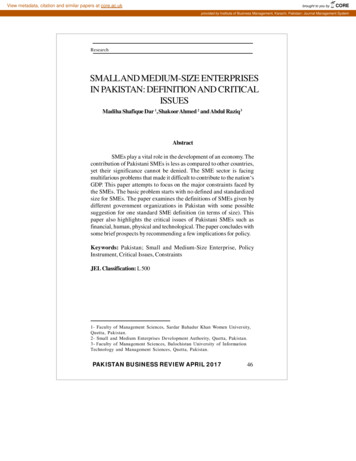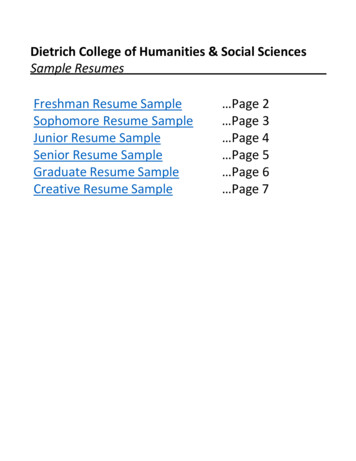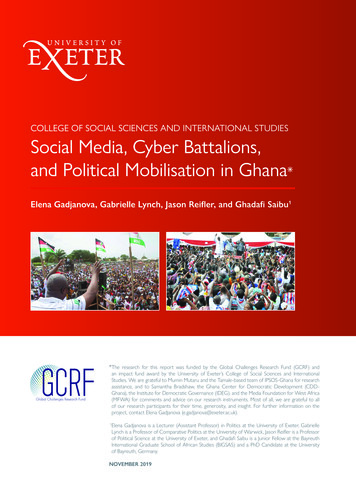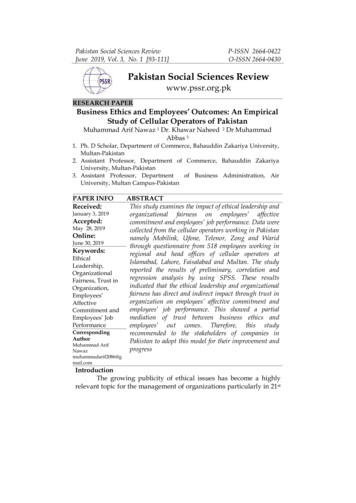
Transcription
Pakistan Social Sciences ReviewJune 2019, Vol. 3, No. 1 [93-111]P-ISSN 2664-0422O-ISSN 2664-0430Pakistan Social Sciences Reviewwww.pssr.org.pkRESEARCH PAPERBusiness Ethics and Employees’ Outcomes: An EmpiricalStudy of Cellular Operators of PakistanMuhammad Arif Nawaz 1 Dr. Khawar Naheed 2 Dr MuhammadAbbas 31. Ph. D Scholar, Department of Commerce, Bahauddin Zakariya University,Multan-Pakistan2. Assistant Professor, Department of Commerce, Bahauddin ZakariyaUniversity, Multan-Pakistan3. Assistant Professor, Departmentof Business Administration, AirUniversity, Multan Campus-PakistanPAPER INFOReceived:January 3, 2019Accepted:May 28, 2019Online:June 30, ess, Trust inOrganization,Employees’AffectiveCommitment andEmployees’ JobPerformanceCorrespondingAuthorMuhammad ArifNawazmuhammadarif2086@gmail.comABSTRACTThis study examines the impact of ethical leadership andorganizational fairness on employees’ affectivecommitment and employees’ job performance. Data werecollected from the cellular operators working in Pakistannamely Mobilink, Ufone, Telenor, Zong and Waridthrough questionnaire from 518 employees working inregional and head offices of cellular operators atIslamabad, Lahore, Faisalabad and Multan. The studyreported the results of preliminary, correlation andregression analysis by using SPSS. These resultsindicated that the ethical leadership and organizationalfairness has direct and indirect impact through trust inorganization on employees’ affective commitment andemployees’ job performance. This showed a partialmediation of trust between business ethics andemployees’ out comes. Therefore, this studyrecommended to the stakeholders of companies inPakistan to adopt this model for their improvement andprogressIntroductionThe growing publicity of ethical issues has become a highlyrelevant topic for the management of organizations particularly in 21st
Business Ethics and Employees’ Outcomes:An Empirical Study of Cellular Operators of Pakistancentury (Mendonca & Kanungo, 2007; Halinen & Jokela, 2016). In aPost-Enron Era, organizational practitioner has strong motivation todevelop their organizational business ethics which attract theattention of researchers to look at the impact of dimensions ofbusiness ethics (ethical leadership and organizational fairness) onemployees’ work outcomes such as commitment and performance(Badrinarayanan, Ramachandran, & Madhavaram, 2017; Bligh, 2017;Mulki, Jaramillo & Locander, 2008). The term organizationalcommitment become famous required great attention in psychologicalliterature and organizational behavior (Mathieu and Zajac, 2005). Ithas been perceived that rating a good understanding of employee,group and organization process having relation with organizationalcommitment has important implication for the individual,organization and society (Mowday, Steers and Porter, 1979). Thisincreased the interest of researchers that can be seen in growingtelecom operators like Pakistan that are committed to uphold theservice mission of “Customer First, Service Foremost”. Themanagement of these telecom operators is expecting to maintain thehighest ethical standards in their organizations like other businessorganizations (Brown, & Treviño, 2006). To uphold these ethicalstandards, these organizations are trying to demonstrate ethicalleadership by providing organizational fairness, and trustworthyenvironment within their organizations which can be seen throughtheir mission statement (Mendonca & Kanungo, 2007). In the extantliterature, it is well argued that these ethical standards influencepositively on employees’ work place attitudes and behaviors.Like other countries, Pakistan Telecom cellular operators arefacing the challenges of business ethics through setting their ethicalstandards in the changing market environment and competition.Pakistan Telecommunication Authority (PTA) has more than 30%share in Foreign Direct Investment (FDI) and is heading the cellularoperators working in Pakistan. These cellular operators’ has 119.8million subscribers and Rs. 363 billion contribution in country’s GDPin 2012. Moreover, these Cellular Operators has registered a growthrate of 150% from 2003 to 2012 (PTA, 2012). This rapid growth andhigh competition in cellular operators of Pakistan indicated that thereis need to emphasis on the development of business ethics in order toconduct their daily business affairs. These operators can get benefitsfrom their employees that can generate positive work outcomesthrough the development and implementation of high business ethics94
Pakistan Social Sciences Review (PSSR)June 2019, Vol. 3, No.1especially ethical leadership, organizational fairness, organizationaltrust, affective organizational commitment and organizationalperformance. Keeping in view the expected benefits, the objective ofthe current study proposing that Cellular Operators operating inPakistan should have two dimensions of business ethics: first, ethicalleadership-knowing and doing what is right, second, organizationalfairness-employees like to be treated fairly (Bello, 2012).Ethical LeadershipLeadership has been one of humans most devoted pursuitsand is the basic sense involves in the process of influence (Yukl, 2010).Previous scholars have defined the concept of leadership in theorganizational sciences particularly in organizational behavior, whichinfluences a group of individuals to achieve a common goal (Cullen etal., 2003; Neubert et al., 2009; Trevino et al., 2003; Brown et al., 2005).There are three theories used to explain leadership: trait leadershiptheory (a situation where some personality traits may lead peoplenaturally into leadership roles), (an important event may cause aperson to rise to the occasion, which brings out extraordinaryleadership qualities in an ordinary person) and process leadershiptheory (leadership skills are learnt) (Bass, 1990).Brown and Trevino (2006) suggested that individual qualitiessuch as moral reasoning, care, and the other qualities should befurther researched in ethical context especially in the ethicalleadership. In the context of ethical leadership, the concept ofattractiveness can be viewed as a function of leader’s status andinvolves the added dimensions of care, concern, and fair treatment offollowers. Parallel to the notion of attractiveness, a final importantdimension of ethical leadership is the leader’s trustworthiness.Trustworthiness also enhances a leader’s credibility in the rolemodeling process (Brown and Treviño, 2006).Organizational FairnessGreenberg (1990) defined “organizational fairness eulogizeswork place fairness, particularly employees’ consideration of fairnessand how efficient treatment affects other employee work relatedchanges (Moorman, 1991). Organizational fairness explainsemployee’s consideration about organization which is based on95
Business Ethics and Employees’ Outcomes:An Empirical Study of Cellular Operators of Pakistanemployees’ self-assessment and evaluation of subjectivity and is basedon three factors; namely distributive fairness, procedural fairness, andinteractional fairness. It is based on what people presumed torightness.Trust in OrganizationAn employee wants to be treated trustfully and wishes to bevulnerable to their actions of organization. The organization shouldcommunicate to their employees through its worker that it can betrusted. Employee working within an organization is importantsource of information consisted on co-workers that can be explainedthrough the theory of social information processing (Salancik andPfeffer, 1978). The theory explains that individual’s socialenvironment plays a vital role in constructing their attitude andbehavior. Therefore, employees assess their co-workers attitude andbehavior that are acceptable and arrange their own belief according totheir co-workers (Salancik and Pfeffer 1978). Thus, the trust ofemployees to their coworkers captivated the trust to theirorganization because the employees regard their coworkers bothrelatively and socially acceptable. When co-workers made it clear thatthe actions of organization are beneficial, it will influence employeestrust towards working organization.Employees’ Affective CommitmentThe scholar has pointed out that organizational commitmentindicates individual’s attachment with his/her organization, and itcan be seen in the relative strangers of individual (Mulki, andMarshall 2005; Staw, 1977). Committed employees come to know theirorganizational goals and values and also the desire for themembership manning’s known as attitudinal commitment. Thescholars have explains three from of affective commitment: normative.Affective commitment is a most important form ofcommitment with organization which is defined as “an emotionalattachment to, identification with, and involvement in theorganization” (Meyer and Allen 1984).Affective commitment explainsworker’s engagement or emotional bond with his/her organizationhas been considered an important antecedent of positive workoutcomes (Mowday, Steers, and Porter, 1979; Rhoades, Linda, Robert,96
Pakistan Social Sciences Review (PSSR)June 2019, Vol. 3, No.1and Armeli 2001). Affectively committed employees have sense ofbelongings and identification with their organization which increasetheir participation and affiliation with their organization and itsactions which increase their willingness to stay within an organizationfor longer period of time. This type of commitment is a psychologicalcommitment which includes inner inspiration and determined orcommitment minds. With affective commitment employee canprovide benefits to their organization, for example, they can stay theirorganization because of their own desire which can decreases theirturnover (Meyer, Herscovitch, & Topolnytsky2002; Wasti, 2002 Brownand Trevino 2006; Neubert et al. 2009).Employees’ Job PerformanceTsui et al (1997) argued management and employeessupportive create a balance between employee’s performance on theircore job and activities which in turn provide benefit to their workingorganization as larger unit. Employee-management relationshipincreases the employee’s performance when they focus on their coretasks and activities. If the employees want to be successful in theirorganization, it is important for them to increase their performance.To increase employee’s performance, it is important to prepareperformance plan in well-documented form that must include what isexpected from them and include both critical and non-criticalelements.Hypothesis Development and Conceptual FrameworkEthical Leadership and Employees’ Affective CommitmentIn the extant literature, ethical leadership is supposed to betrustworthy and fair, and committed to their organization ( Hartlineand Ferrell, 1996; Hartline et al. 2000; Brown & Trevino 2006;Neubert et al., 2009). The study of Brown and Trevino (2006)supported a significant relationship between ethical leadership andaffective commitment. Another study of Berrone et al., (2007) arguedleader ethical behavior is important for employee’s commitment totheir organization. Thus, based on the above mentioned argument sand empirical support, this study proposed the following hypothesis:97
Business Ethics and Employees’ Outcomes:An Empirical Study of Cellular Operators of PakistanH1: There is a positive relationship between ethical leadership and affectivecommitment.Ethical Leadership and Trust in OrganizationTrust is a key aspect to strengthen the relationship andbuilding successful working relationships between leaders andworkers that facilitates collaboration, helps to managetransformations, encourages knowledge sharing, and increasessincerity (Argyris, 1970; Den Hartog, 2003; Dirks & Ferrin, 2002; Lane,1998; Mayer et al., 1995; Shapiro, 1987; Tsai & Ghoshal, 1998; Zucker,1986). There are studies that supported a significant positiverelationship between ethical leadership and employees trust to theirorganization (Van den Akker, Heres, Lasthuizen, & Six, 2009).Therefore, based on the results of empirical studies, this studyproposed the following hypothesis:H2: There is a positive relationship between ethical leadership and trust inorganization.Ethical Leadership and Employees’ Job PerformanceEmployee working in an organization is considered asimportant human resource for organization, without employees, theorganizations cannot achieve its goals and objectives. Extant literatureshows a vital and significant influence of the ethical leaders for thesuccess of job performance (Piccolo, et al., 2010, Resick et al., 2011,Ruiz and Martinez, 2011). For instance, Piccolo, et al. (2010) suggestedthat leaders with vital commitment can affect the tasks significanceand autonomy of job characteristics model and individuals wish tomake extra struggle on work performance. When the leaders fail tofollow the role, it is called un-ethical, failure to take responsibility andto avoid impropriety (O‟Connell and Bligh, 2009). The study of Toorand Ofori (2009) reveals that ethical leadership plays a role in creatingrelationship between employees work outcomes. Extant literature hasdemonstrated a relationship between ethical leadership andemployee’s work outcomes such as job performance, ethical leadershave eye-catching and appropriate role model that grasp theirworkers attention and they help and influence on the achievement oftheir performance related goals ( Brown et al. 2005). Precisely, it isclaimed that ethical leaders have a positive impact on Employees’ JobPerformance because they explain to their workers the right thing is to98
Pakistan Social Sciences Review (PSSR)June 2019, Vol. 3, No.1do on their jobs (De Hoogh and Den Hartog 2008).Therefore, thisproposed the following hypothesis that:H3: There is positive relationship between ethical leadership and jobperformance.Organizational Fairness and Employees’ Affective CommitmentDubinsky and Levy argue that organizational fairnessindic
namely Mobilink, Ufone, Telenor, Zong and Warid through questionnaire from 518 employees working in regional and head offices of cellular operators at Islamabad, Lahore, Faisalabad and Multan. The study reported the results of preliminary, correlation and regression analysis by using SPSS. These results indicated that the ethical leadership and organizational fairness has direct and indirect .
